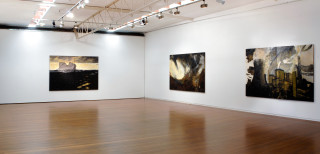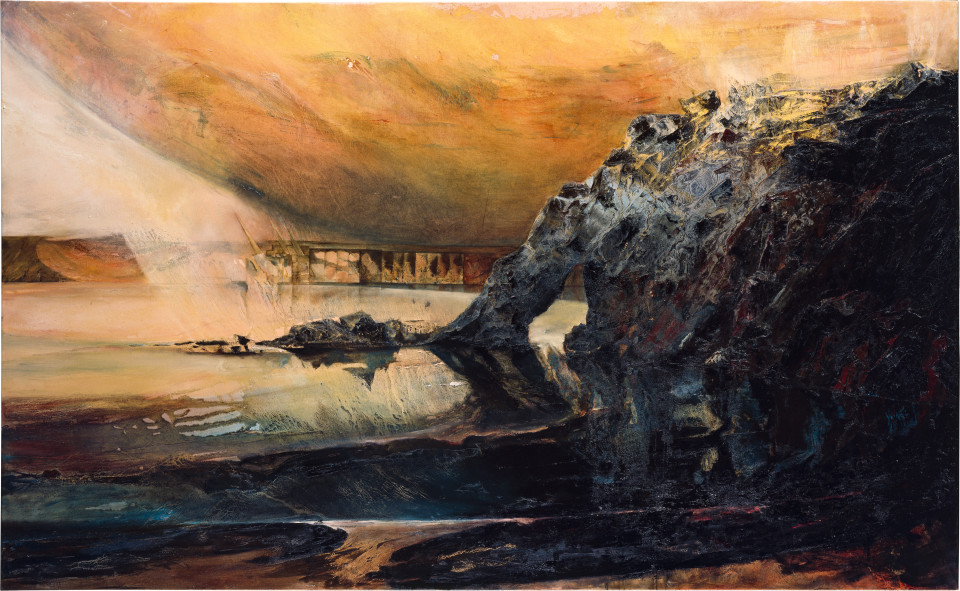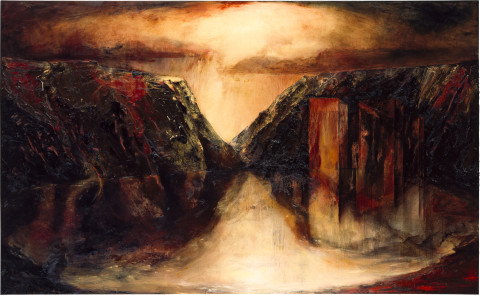Mandy Martin's fourth solo exhibition at Roslyn Oxley9 Gallery.
Exhibition Dates: 14 March – 1 April 1989
RIDING THE TIGER • IAN NORTH
Mandy Martin deploys grand romantic stimuli that just about everyone responds to and certainly knows; brooding head-lands, jagged cliffs, the boiling sea and sky beyond. More to the point, she does not sing but stutters the codes, uses gold paint, sudden bursts of sulphurous pink, pitches her horizon line too high and even dares a literalism whereby thick paint = rock, thin paint = water.
Even so, the jagged lines and awkward shapes of Martin's cliffs do not bespeak the condition of rock ( or Wagner) but rather that of a sceptical mind abroad on a poisoned planet. The works read like romantic dreams subjected to waking doubt and intelligence, with both aspects see-sawing. It apparently occurred to Martin some years ago that the environment is the key issue of our time. In this she is, quite simply, correct, a fact which the slight but real relaxation of the Cold War allows us to see more clearly. Without the environment, nothing: after it, so to speak, the deluge and the desert in unlikely places, an international order turned on its head and an extremely uncertain future for all known life forms.
Martin's titles indicate human intervention in the landscape, both pre and post-industrial; in some, indications of early European contact suggest a Fall from Grace, the textured working of earth-forms, an ancient culture. In the notion of Grace lies an irritating, intriguing, ambiguity, for some of Martin's works, for example The Elliptical Bay series with their dominant ovoid compositions, extend the very romanticism she excavates and undermines in others.
Unmediated neo-romanticism, even if (necessarily) shorn of belief in absolutes and revelation, is a nonsense. When, as in Martin's work, it embodies pro-planetary observations, con-ditioned by critical distancing, it is not only useful but exhilar-ating. The artist pungently critiques conventional notions of nature, while deftly riding on their back.

enamel paint, pigment and acrylic binder on craft paper
113 x 152 cm
 Mandy Martin Wanderers in the Desert of the Real
Mandy Martin Wanderers in the Desert of the Real
Roslyn Oxley9 Gallery, 2008
 Mandy Martin Salvadoresque
Mandy Martin Salvadoresque
Roslyn Oxley9 Gallery, 2006
 Mandy Martin Absence And Presence
Mandy Martin Absence And Presence
Roslyn Oxley9 Gallery, 2004
 Mandy Martin Salvator Rosa series IV
Mandy Martin Salvator Rosa series IV
Roslyn Oxley9 Gallery, 2002
 Mandy Martin Salvator Rosa Series II
Mandy Martin Salvator Rosa Series II
Roslyn Oxley9 Gallery, 1999
 Mandy Martin Recent Works
Mandy Martin Recent Works
Roslyn Oxley9 Gallery, 1997
 Mandy Martin
Mandy Martin
Roslyn Oxley9 Gallery, 1995
 Mandy Martin
Mandy Martin
Roslyn Oxley9 Gallery, 1993
 Group Show, Christmas show
Group Show, Christmas show
Roslyn Oxley9 Gallery, 1991
 Mandy Martin
Mandy Martin
Roslyn Oxley9 Gallery, 1991
 Mandy Martin
Mandy Martin
Roslyn Oxley9 Gallery, 1989
 Group Show, The Cocktail Party (All Gallery Artists)
Group Show, The Cocktail Party (All Gallery Artists)
Roslyn Oxley9 Gallery, 1988
 Group Show, Chaos
Group Show, Chaos
Roslyn Oxley9 Gallery, 1987
 Mandy Martin
Mandy Martin
Roslyn Oxley9 Gallery, 1986
Mandy Martin
Roslyn Oxley9 Gallery, 1984
Group Show, Australian Visions
Solomon R. Guggenheim Museum, New York, 1984









